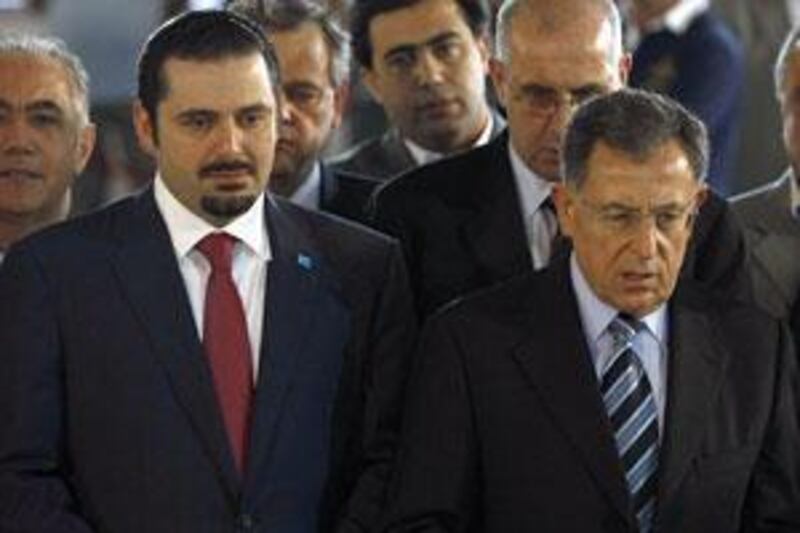BEIRUT // Saad Hariri, the son of the former prime minister killed in a 2005 car bomb attack, was named premier of Lebanon's incoming government in a vote yesterday that, although widely expected, now sets the stage for the difficult wrangling apparently necessary to form an effective government.
Mr Hariri's bloc captured 71 seats of 128 in the new parliament this month, enough to take control of the cabinet, but his alliance has spent the week negotiating with the Hizbollah-led opposition over the formation of a national unity government. Last week, he held a three-hour visit with the Hizbollah leader, Hassan Nasrallah, to discuss ending the political stalemate that paralysed the country for two years. Mr Hariri's alliance prevailed in the elections by a narrow margin, cracking the stalemate but setting up potential difficulty in setting up a government.
On Thursday, the parliament selected a key opposition figure, Nabih Berri, to his fifth term as speaker, in a move widely seen as a concession to Mr Hariri's political foes, but the refusal of many of the government's Christian allies to support Mr Berri indicates that bad blood continues between the two sides as they negotiate on the future cabinet's make-up. Although there is no constitutional requirement that Mr Hariri's bloc consult with the opposition in forming a cabinet, the political realities in Lebanon's deeply fractured political culture essentially insist that both sides negotiate to form a national unity government.
Michel Suleiman, the Lebanese president certified Mr Hariri's victory with 86 votes - from his bloc as well as support from Mr Berri's Amal Movement - while calling upon the majority to now form a cabinet. "According to the constitution and after the president consulted with the speaker of parliament and parliamentarians, he [Suleiman] summoned Saad Hariri and tasked him with forming a new government," a statement from the president's office said.
But to successfully do so will require careful negotiations with the opposition, in particular with Hizbollah, the armed militant Shiite group that holds far more sway in Lebanon than its 14 seats in parliament would indicate. The mostly Sunni supporters of Mr Hariri have politically and violently clashed with the far-better organised and heavily armed Shiite supporters of Hizbollah over the past three years. The 2005 murder of his father, Rafik, a popular former prime minister who had begun to oppose Syrian involvement in Lebanon, sparked a power struggle that quickly took on sectarian overtones. After the 2006 summer war between Hizbollah and Israel, tensions quickly escalated as Sunnis blamed the militant group for starting the war and Hizbollah moved against a government it felt had supported its enemies.
After a series of strikes failed to bring down the government, then led by Mr Hariri's key ally, Fouad Siniora, Hizbollah and its supporters clashed with Sunni supporters throughout Beirut on May 7 2008 in a series of battles that left scores dead and eliminated Sunni military presence in Beirut. A deal to stop the fighting led to a unity government and the election of the president, but the unity government expired after Mr Hariri's victory at the polls.
Mr Hariri's coalition of Sunnis, Druze and some Christians is reported to have offered a 30-seat cabinet that gives 16 seats to the majority, 10 to the opposition and four seats to a bloc loyal to the president, who is widely perceived as neutral in the struggle. This offer, however, lacks the minority veto that Hizbollah has strongly hinted it would require to join the government. It remains unclear what the group's unwillingness to join the cabinet might portend, but any cabinet that does not contain a significant voice for the opposition would not be seen as legitimate throughout much of Lebanon.
The president is reported to be pushing for a 14 majority-seat cabinet, nine seats to the opposition and seven to the president in hopes that a presidential veto over cabinet decisions will assuage Hizbollah, but the offer has not been publicly responded to by either side. But at only 39 years old, Mr Hariri faces a tough battle for legitimacy in the eyes of many Lebanese, even those who adored his father. One Hizbollah supporter warned the majority not to antagonise Hizbollah on the deeply divisive issue of its remaining an armed resistance group without government oversight.
Mr Hariri "should understand that the guns of the resistance are a red line", said Hussain Salim, a businessman from south Lebanon. "He should prove that he will protect the resistance like his father did. "If he shows the will of co-operation with Hizbollah, then he is fine. I will tell you that he is still not a good politician, and not even charismatic, and I don't see him succeeding. Because politics, it's too complicated in Lebanon. His father was a smart man, [but Saad] is not Rafik."
mprothero@thenational.ae





